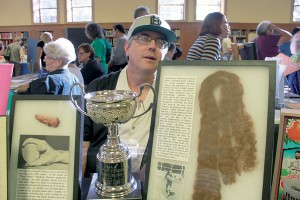USC Libraries hosts eighth annual Los Angeles Archives Bazaar
Saturday marked the 8th annual Los Angeles Archives Bazaar, where organizations such as the Venice Heritage Foundation, Getty Research Institute and the University of California, Irvine Libraries Special Collections set up public exhibitions in Doheny Memorial Library.

SoCal buff · Jon Leonoudakis, one of the presenters on Saturday, is shown with a detached finger and hair of Tom Dewhirst, a former baseball player. – Jessica Zhou | Daily Trojan
This is the fourth year the event has been held at Doheny and its sixth year at USC. The event is hosted by the USC Libraries and planned by L.A. as Subject, a research alliance that connects more than 230 archival collections held by both institutions and individuals. The only requirement to participate in the bazaar is to hold a collection that focuses on Los Angeles.
“It’s so important to instill a sense of place into the next generation,” said Todd von Hoffman, president of the Venice Heritage Foundation. “When [people] have a sense of pride of where they live, they are much more apt to […] impart that enthusiasm and respect for history unto the next generation.”
The event hosted many exhibits highlighting parts of California history in unique ways, including a display that was distinguished by a large basketball-sized plastic orange looming more than 6 feet above the ground. David Boulé used the exhibit to display his extensive research on the California orange and his latest book, in which he examines the impact of the orange on California’s agricultural industry and our cultural image of California.
Special events and panels were also held throughout the day, such as “Craft Brewing in L.A.: Tastes and Traditions.” In this panel, brewmaster Dieter Foerstner of Angel City Brewery discussed the history of American beer, the resurgence of craft brewing in Los Angeles and the birth of some of the brewery’s more quirky brews: the “Avocado Ale,” inspired by guacamole, and the “French Sip,” a brew crafted to taste like au jus.
Later in the day, participants were provided a preview to The Good Giants, a documentary about the Buffalo Soldiers, an all-black regiment of the army, and the irony behind their liberation of Italian villages in WWII while being treated as second-class citizens in America.
Inspired by PBS’ Antiques Roadshow, the Los Angeles Preservation Network held their own “Archives Roadshow” at this year’s bazaar. Here, individuals could bring their documents and photographs of historical significance, and have them examined and digitized by professional archivists. Participants also received instructions on how to best handle and preserve their documents.
The bazaar has recently grown in recognition among those who work in history, and also has much to offer for the participating institutions.
“There are 10 percent more exhibitors each year,” said Liza Posas, coordinator for L.A. as Subject. “It gives them an opportunity to evolve how they promote their institution. [The exhibitors] have learned how to articulate themselves and make their exhibits fun and relevant. It’s a networking opportunity.”
The event participants hail primarily from the greater Los Angeles community. Many professional archivists and historians as well as history buffs and students from other colleges attended. Many of the historians emphasized how important history is to education at all levels.
“Where’s the first place the government cuts in a crisis? Library and archives. Math and science are heavily valued, but history is also important,” said Nancy Saul-Larson, an archivist and historian with the Topanga Historical Society.
Kevin Lopez, a junior majoring in chemical biology, entered Doheny Library in search of books for his Writing 340 class, but soon struck up into a conversation with the Genealogical Society of Hispanic America.
“I really appreciate the interest for people to document the past,” Lopez said. “Preservation of culture through technology, and its ability to help me develop connections with my heritage, really caught my interest.”
For Jessica Zhou, a freshman majoring in business administration, the sheer amount of history in Los Angeles was what drew her to the event.
“I’ve always liked history,” Zhou said. “This may or may not become a hobby for me, but will I be back next year? Definitely.”
Posas was excited that students were interested in the subject and getting involved.
“Everybody has history,” Posas said. “We don’t have to celebrate the history of those who conquered, those who win, those who are stars, but the everyday person. I hope people understand that it starts with their history, and ripples outward into an engagement with history.”
Follow us on Twitter @dailytrojan
